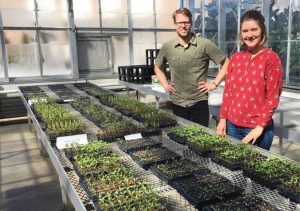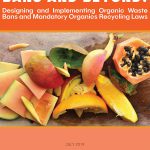BioCycle November/December 2019
Latest EPA MSW Facts & Figures
The U.S. EPA released its annual report on municipal solid waste management (MSW) in the U.S., “Advancing Sustainable Materials Management: 2017 Fact Sheet,” in November 2019. Approximately 267.8 million tons (U.S. short tons unless specified) of MSW were generated in 2017, a negligible increase from 266.8 million tons in 2016. Of the MSW generated, more than 139 million tons of MSW (52.1 percent) were landfilled. Approximately 67 million tons were recycled and 27 million tons of were composted, equivalent to a 35.2 percent national recycling and composting rate. More than 34 million tons of MSW (12.7 percent) were combusted with energy recovery.
The amount of food waste generated in the U.S. in 2017 was 40.7 million tons. (A footnote indicates this includes other MSW organics but doesn’t specify what types. Of the 40.7 million tons, 2.57 million tons were composted and 30.63 million tons were disposed (6.3% and 75.3%, respectively, with 7.5 million tons combusted (18.3%)). About 35 million tons of yard trimmings were generated in 2017; 24.4 million tons were composted (69.4%) and 8.7 million tons were landfilled (24.6%).
Food Recovery And Preservation Facility
As part of its initiatives to achieve zero waste, the City of Oceanside, California, invested $1.5 million to create Green Oceanside Kitchen — a “state-of-the-art food recovery and preservation facility designed to foster a sustainable food system and offer culinary learning opportunities dedicated to wasting nothing and feeding our community.” The City issued a Request for Proposals for an entity to operate Green Oceanside Kitchen (GOK), “spawning numerous ideas for implementation,” explains Colleen Foster, the City’s Environmental Officer. Ultimately, a public-private partnership was formed with O’Side Kitchen Collaborative (OKC), a local nonprofit with a mission to partner with local farms and food businesses “to divert and rescue fresh produce to nourish and educate the community.” OKC is self-funded through its catering operations, Catering For A Cause. Under its contract with the City, OKC will operate and develop programming and catering services focused on sustainability, food recovery and zero waste, out of the GOK.
 An existing City building adjacent to its senior center and future aquatics recreational center houses GOK. It consists of an industrial kitchen, a demonstration kitchen, and a banquet room with a large outdoor area to host events. Zero waste cooking classes, workshops and job training classes are offered to raise awareness and educate participants on solutions to food waste and culinary arts. The classes are opened to the community, however the City, through its Green Oceanside Program, is working with OKC to provide targeted programming as well (e.g., cooking classes for seniors, at risk youth and veterans). The job training program is still being developed, however the initial target is to provide culinary training for all of OKC’s operations, including its private catering events.
An existing City building adjacent to its senior center and future aquatics recreational center houses GOK. It consists of an industrial kitchen, a demonstration kitchen, and a banquet room with a large outdoor area to host events. Zero waste cooking classes, workshops and job training classes are offered to raise awareness and educate participants on solutions to food waste and culinary arts. The classes are opened to the community, however the City, through its Green Oceanside Program, is working with OKC to provide targeted programming as well (e.g., cooking classes for seniors, at risk youth and veterans). The job training program is still being developed, however the initial target is to provide culinary training for all of OKC’s operations, including its private catering events.
Green Oceanside Kitchen is developing its business model, which has three primary components: Increasing partnerships for food rescue with local farmers and gleaning groups; Collaborating with restaurants to offer internships for its students and potential jobs in the field; and Building its catering business to be financially self-sustainable. — Ana Carvalho, BioCycle Contributing Editor
Wasted Food Solutions Tip Sheets
The Center for EcoTechnology (CET) created three Best Management Practice Tip Sheets tailored to businesses and institutions in San Diego County, California, with guidance from CalRecycle, Solana Center, and San Diego Food System Alliance. Topics covered are food waste reduction, food rescue and food waste separation. “The intention is to bolster wasted food diversion efforts across the county, and be a template for other jurisdictions,” explains Coryanne Mansell, Strategic Services Representative at CET. “We worked with San Diego County to tailor our best practices to include local ‘sector spotlights.’ But we also hope these tip sheets can be a resource to jurisdictions as they evaluate how to start enforcing or encouraging food waste diversion.”
Midwest Retailer Pilots Food Waste App
Meijer, a Michigan-based supercenter retailer that operates 246 supercenters and grocery stores in Michigan, Ohio, Indiana, Illinois, Kentucky and Wisconsin, is testing Flashfood, a mobile app where customers can purchase and pay for close-dated fresh food items —including meat, produce, seafood, deli and bakery products — on the Flashfood app at up to 50 percent off. Purchased food will be stored in a refrigerator or storage rack located in the front of each of the four participating Meijer stores until picked up by the customer. “Food is at the core of what we do, and we are constantly looking at ways to minimize in-store waste,” said Don Sanderson, Group Vice President of Fresh for Meijer. “We are excited to work with Flashfood and learn how much food can be spared from landfills.” Flashfood, a Canadian-based company, enables retailers to upload surplus close-dated foods to an app that are available for purchase.
Meijer also has edible food recovery and food waste recycling programs. Its food rescue program donated more than 10.6 million pounds of food in 2018 to local food banks. It diverts waste generated during manufacturing of its foods to animal feed, anaerobic digestion and composting.
Front-Of-House Food Waste Bin Mandate
California Gov. Gavin Newsome signed Assembly Bill (AB) 827 in October, which requires businesses to make organic waste and recycling bins accessible to customers at restaurants, malls, and other businesses. AB 827 mandates that businesses already required to subscribe to recycling services under AB 341 or composting services under AB 1826 provide customers with “a recycling bin or container for that waste stream that is visible, easily accessible, and adjacent to each bin or container for trash, except in restrooms, and is clearly marked with educational signage.” The mandate goes into effect in July 2020. The educational signage will indicate what is accepted in local solid waste programs.
Psychology and Climate Action
Leaders of more than 40 psychological associations from around the world signed a resolution in November asserting that climate change “is a serious global threat, is occurring faster than previously anticipated, and is contributed to by human behavior.”
Participants in the first International Summit on Psychology’s Contributions to Global Health committed to “inform our respective members and the public about climate change, emphasizing scientific research and consensus on its causes and short- and long-term harms, and the need for immediate governmental, societal, community and personal action,” according to the resolution.
“Psychology as the science of behavior change must be actively involved [but] behavior change is going to be different in every country,” explained Arthur C. Evans Jr., CEO of the American Psychological Association. “These climate issues are affecting people now. There are psychological consequences in terms of the anticipatory challenges and in terms of how we help people recover after climate events. … How do you build in your country infrastructure that ensures there are ways of addressing the anxiety and fears people experience as a result of climate change?” The summit opened with the signing of a proclamation on collaboration, committing the 43 signatories to use their professional, scientific, educational, cultural and applied resources “to achieve progress on matters of utmost importance for which psychology offers the greatest contribution.” Initial efforts will focus on the United Nations’ Sustainable Development Goal 13: Take action to combat climate change and its impacts. Participants developed plans for advocacy, media campaigns, research and a toolkit to meet the goals laid out in the proclamation and referendum.
Vermont Phosphorus Innovation Challenge
Vermont Governor Phil Scott announced over $1 million in state funding awarded to five groups for innovative technologies to separate and extract phosphorus from various waste streams as part of Stage III of the Vermont Phosphorus Innovation Challenge (VPIC). VPIC funding has been awarded in stages — Stage III involves full-scale implementation of Stage II projects that competed for Stage III funding. Of the 27 initial VPIC applicants, six groups were selected for initial funding awards. Stage II projects engaged in technology prototyping and business case development, honing their technologies for phosphorus recovery and researching the market potential for the extracted nutrients. The final component of Stage II for VPIC was the submission of a final business report earlier this fall. Following review of the reports, five projects were selected for further development in Stage III. Awardees include:
 • DVO, Inc. and University of Vermont ($500,000): Anaerobic digesters at dairy farms statewide will be enhanced for advanced solids control using Dissolved Air Floatation (DAF) processes. These vessels will develop a “P-Cake” product that is high in phosphorus and other nutrients. A newly formed Vermont company (NEWCO) will operate a new facility in Vermont to process, bag and/or bottle this material as a marketable retail product, as well as produce, sell and distribute bulk fertilizer and soil amendments.
• DVO, Inc. and University of Vermont ($500,000): Anaerobic digesters at dairy farms statewide will be enhanced for advanced solids control using Dissolved Air Floatation (DAF) processes. These vessels will develop a “P-Cake” product that is high in phosphorus and other nutrients. A newly formed Vermont company (NEWCO) will operate a new facility in Vermont to process, bag and/or bottle this material as a marketable retail product, as well as produce, sell and distribute bulk fertilizer and soil amendments.
• Agrilab Technologies Inc. ($320,200): A combination of existing phosphorus (P) recovery technologies, composting and drying equipment will be used to establish a series of hub and spoke sites for P processing infrastructure in four counties in Vermont. Agrilab will utilize its Hot Box 8A-250R, a 20-foot containerized compost aeration and heat recovery (CAHR) unit that can be brought to other farms.
• Digested Organics ($137,500): The funding will be used for construction of a mobile ultrafiltration (UF) system to process manure and/or digested manure from about 100 dairy cows. The unit will include a fiber-removal process and small commercial-scale stainless steel UF system to create permeate (also known as tea water) and concentrate. UF permeate contains very little phosphorus and will remain on the farm for land application while the concentrate (a slurry) rich in phosphorus will be available to nearby farms and composting operations where it can be converted into higher value products.










